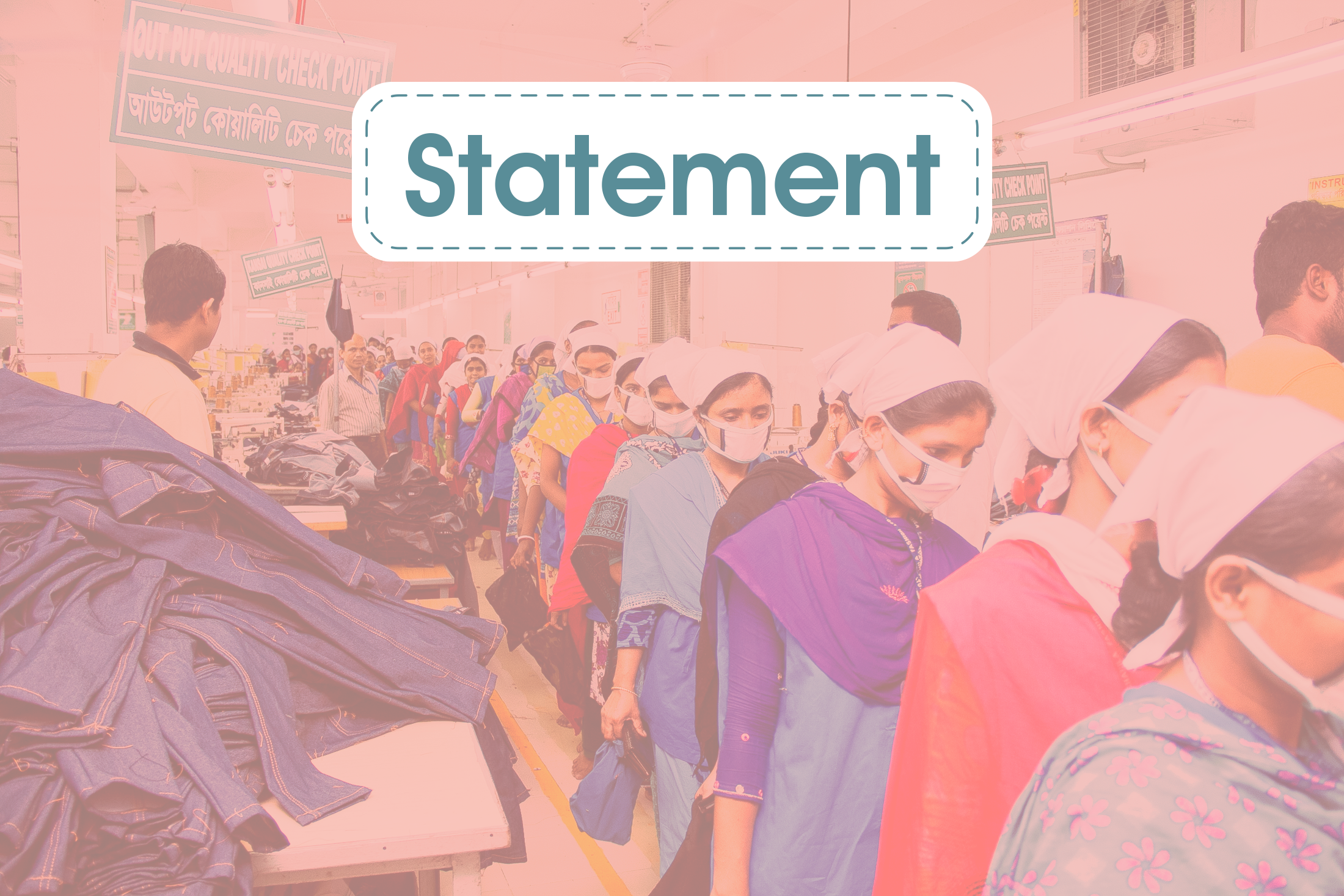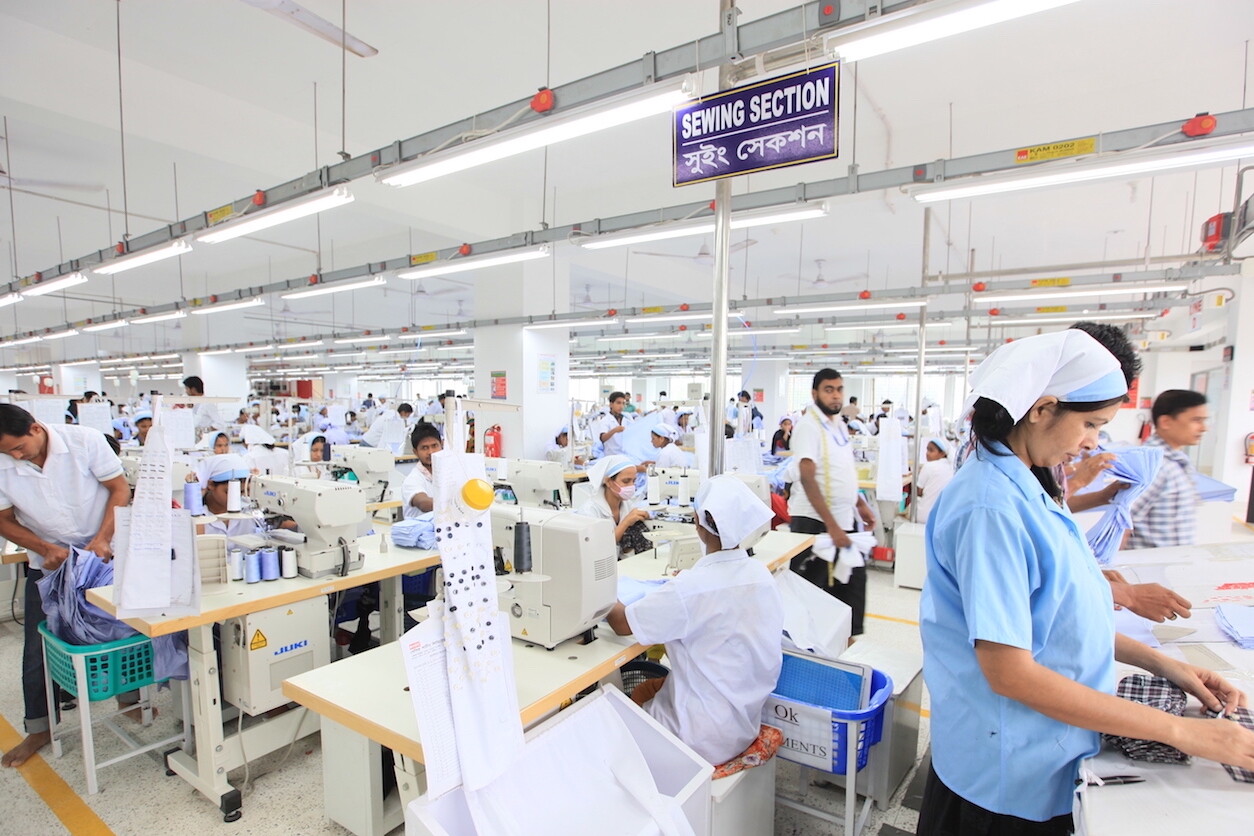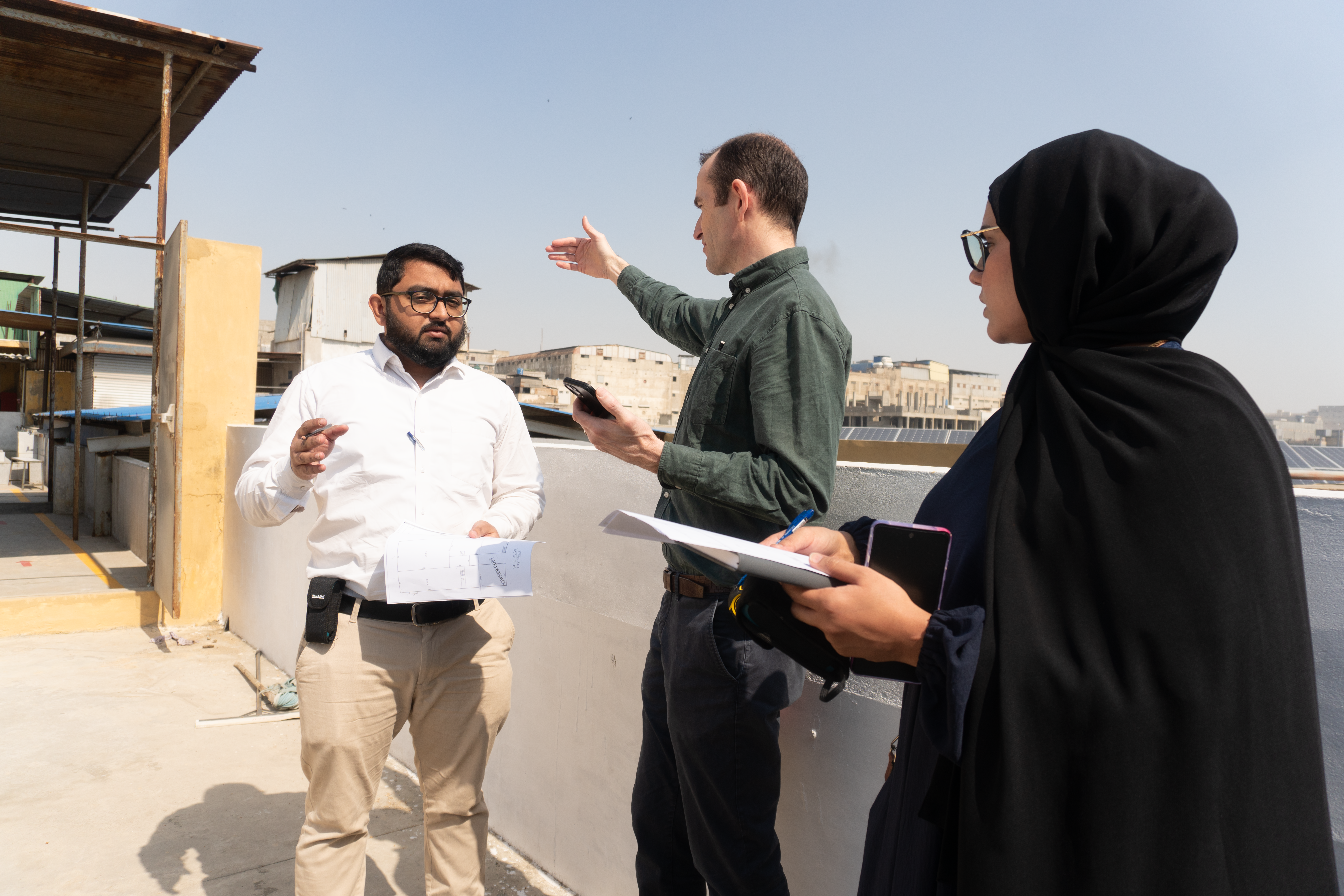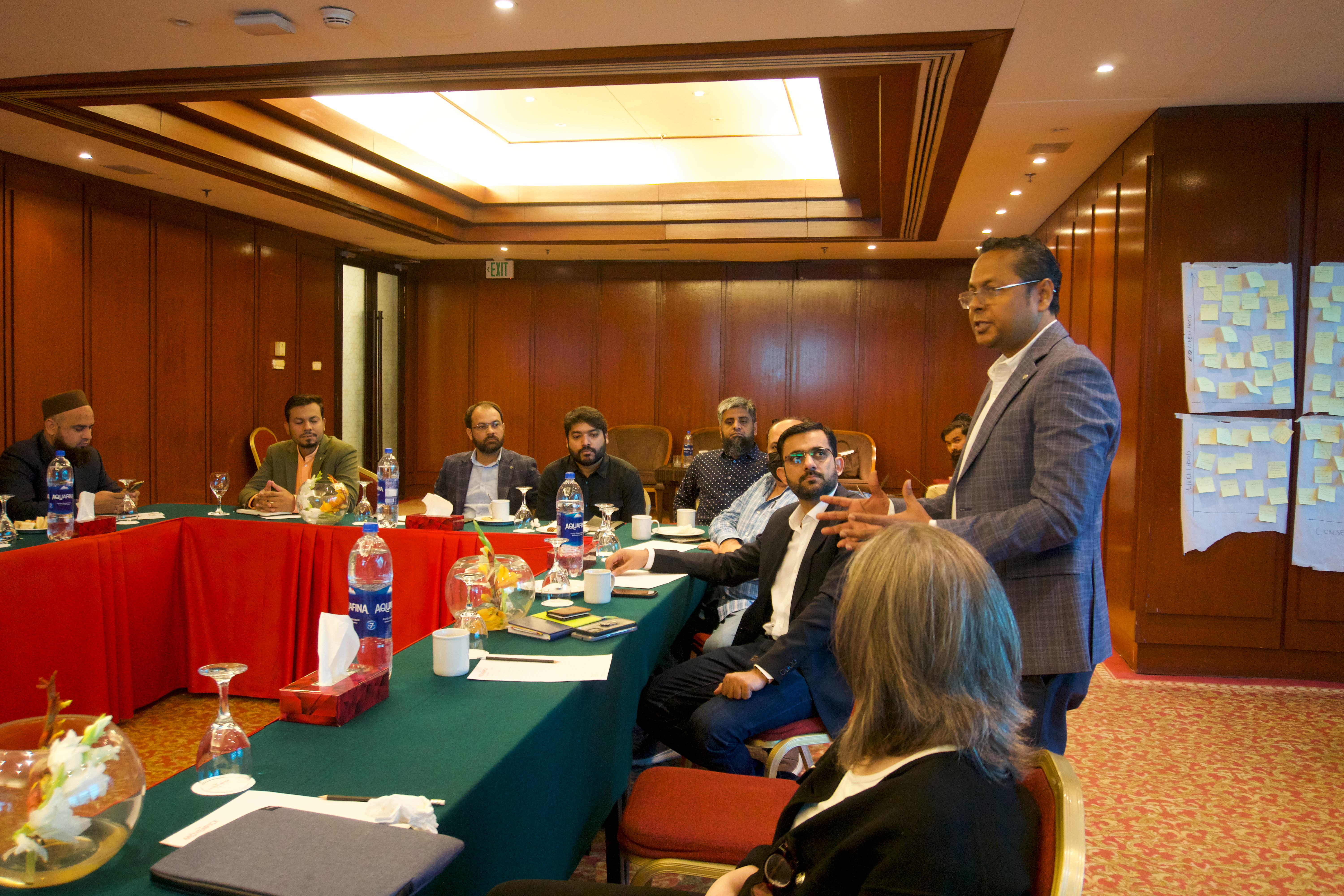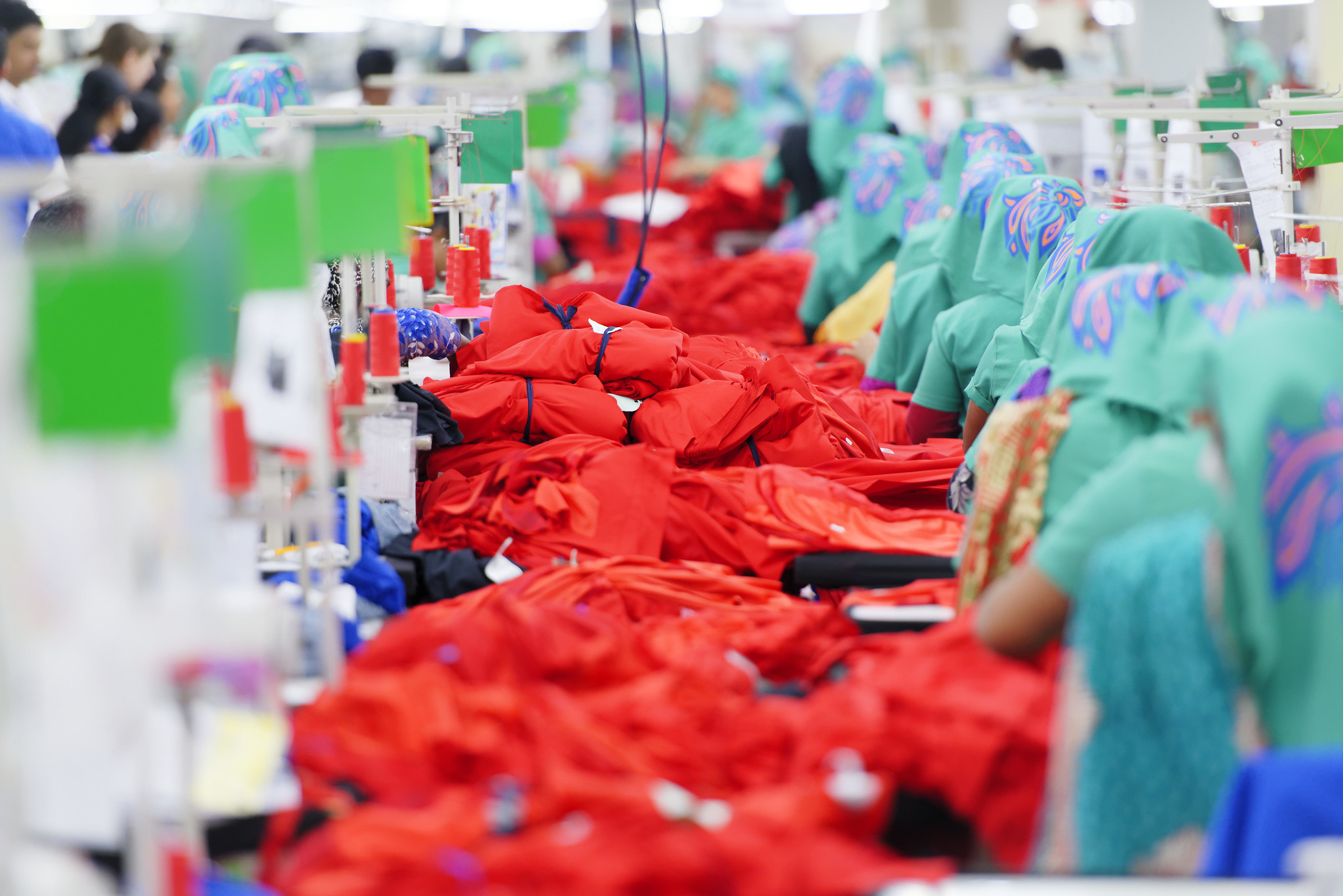A decade of workplace health and safety under the Accord
Statement
Amsterdam, 15 May 2023:
Ten years ago, on 15 May 2013, the Accord on Fire Building and Safety in Bangladesh (Bangladesh Accord) was signed by global clothing companies, UNI and IndustriALL global trade unions, and NGO witness signatories, just three weeks after the Rana Plaza building collapse. This landmark agreement was born out of an urgent need to address the prevalence of serious factory accidents in the textile and garment industry. Ten years on, the Accord Secretariat reflects on the progress on worker safety in the past decade and our vision for the future.
Efforts under the Accord have focused on improving fire and building safety standards and strengthening the capacity of workers and factories in Bangladesh to identify, raise and address a broad range of occupational health and safety issues. Suppliers in Bangladesh have made significant safety improvements at their factories, with support from more than 220 brand signatories who have invested over 70 million USD to finance the Accord programs and operations in Bangladesh.
The Accord, and the RMG Sustainability Council (RSC)since 2020, have conducted nearly 56,000 inspections across over 2,400 garment factories in Bangladesh. Out of the 170,000 health and safety issues identified during these inspections, 140,000 have been corrected through measures such as installation of fire doors, fire alarms, sprinkler systems, fixing faulty electrical systems, and strengthening building structures.
Recognising that safe workplaces cannot be ensured without worker participation, more than 1,200 joint labour-management Safety Committees at Accord-covered factories are now trained and equipped to address and monitor factory safety on a day-to-day basis.
Workers have filed over 6,000 complaints with the independent complaints mechanism which Accord signatories provide.The resolution of these complaints has involved improvements in health and safety at the factory, disciplinary actions against perpetrators, payment of full severance benefits, provision of maternity benefits, reduction of excessive working hours and reinstatements of workers.
“Since the Accord’s inception, its signatories and partners have contributed to the continuous and sustained remediation of health and safety risks at garment and textile factories in Bangladesh. Recognising that more remains to be done and against the backdrop of increasing human rights due diligence legislation, we look forward to a decade of greater collaboration with all relevant stakeholders to strengthen safety standards, support capacity building, and foster an environment of accountability and transparency in the textile and garment industry,” Joris Oldenziel, Executive Director, International Accord
Looking ahead, the Accord has a mission to encourage greater collaboration between different stakeholders, including brands, unions, manufacturers, governments, and civil society organisations for a safe and healthy garment and textile industry. We remain committed to building a safe and sustainable future for all workers in the garment and textile industry in Bangladesh and implementing the Pakistan Accord in close collaboration with the signatories and their local counterparts, the Pakistan government authorities and the garment and textile manufacturing industry.
On behalf of the Accord signatories,
The International Accord Secretariat
END
For more information, contact:
- media@internationalaccord.org
- Mini Dixit, Communications Officer: mini.dixit@internationalaccord.org
Related updates
May 1, 2024
Day 2 of the International Accord’s All Signatory Meeting was dedicated to fostering meaningful engagement between the Pakistani industry and signatories to the Pakistan Accord.
April 24, 2024
The Accord commemorates 11 years since the Rana Plaza collapse by remembering those who perished, those who were injured, and those who continue living with the impacts of one of the worst workplace disasters in modern history.
March 28, 2024
The capacity-building program for recently hired engineers under the Pakistan Accord has officially commenced.
March 28, 2024
A series of recent brand-supplier meetings in Lahore and Karachi brought together Pakistan Accord signatory brands and their suppliers for discussions on enhancing occupational health and safety in the textile and garment industry.
January 25, 2024
Original Marines, Turner Bianca, S.O.K/ Group, Sun Garden,Tex Idea, and MPL Home are among the latest brands to sign the Pakistan Accord.
January 24, 2024
A total of 102 global brands and retailers have so far signed the Bangladesh Safety Agreement with Fast Retailing Co. Ltd, River Island and Triumph & Sloggi, among the latest signatories.
Over 50 global brands and retailers have signed the Pakistan Accord
Accord
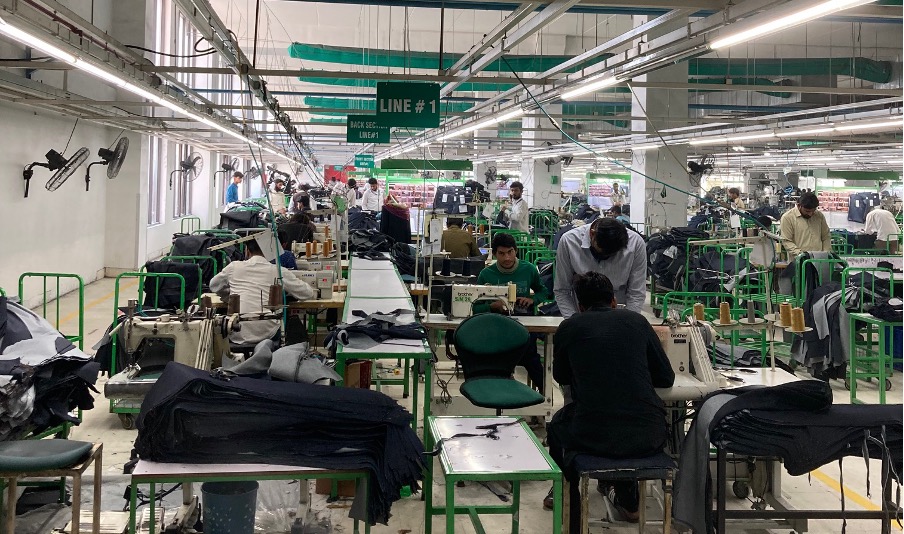
More than 50 global brands and retailers sign Pakistan Accord for Health and Safety in Textile and Garment Industry.
More than 50 global brands and retailers sign Pakistan Accord for Health and Safety in Textile and Garment Industry.
A total of 54 brands and retailers have thus far signed the Pakistan Accord for Health and Safety in the Textile and Garment Industry, with more expected to follow in the coming weeks. Among the latest signatories are Hugo Boss, Solo Invest, Uhlsport, and Kmart Australia. You can view the full list of Pakistan Accord signatories here.
The Pakistan Accord has been open to signature by global brands and retailers since 16 January 2023. On January 23, 2023, members of the Accord Steering Committee, including BESTSELLER, C&A, H&M, Inditex, Otto Group, and PVH Corp., released a statement reaffirming their commitment to the Accord and encouraging more brands to join.
“We invite all brands around the world to sign the Pakistan Accord and join us in our collective commitment to raise safety standards at supplier factories in Pakistan,” the statement reads.
The Pakistan Accord is a legally binding agreement between IndustriALL Global Union and UNI Global Union, and garment brands and retailers for an initial term of three years, starting in 2023. The program will be implemented through close collaboration and involvement of the Pakistan government authorities and the manufacturing industry.
We reiterate our invitation to all brands and retailers sourcing from Pakistan to sign the Pakistan Accord and join our collective mission of a safe and sustainable Pakistani textile and garment industry.
Resources
Related updates
May 1, 2024
Day 2 of the International Accord’s All Signatory Meeting was dedicated to fostering meaningful engagement between the Pakistani industry and signatories to the Pakistan Accord.
April 24, 2024
The Accord commemorates 11 years since the Rana Plaza collapse by remembering those who perished, those who were injured, and those who continue living with the impacts of one of the worst workplace disasters in modern history.
March 28, 2024
The capacity-building program for recently hired engineers under the Pakistan Accord has officially commenced.
March 28, 2024
A series of recent brand-supplier meetings in Lahore and Karachi brought together Pakistan Accord signatory brands and their suppliers for discussions on enhancing occupational health and safety in the textile and garment industry.
January 25, 2024
Original Marines, Turner Bianca, S.O.K/ Group, Sun Garden,Tex Idea, and MPL Home are among the latest brands to sign the Pakistan Accord.
January 24, 2024
A total of 102 global brands and retailers have so far signed the Bangladesh Safety Agreement with Fast Retailing Co. Ltd, River Island and Triumph & Sloggi, among the latest signatories.
10 years since the Rana Plaza collapse in Bangladesh
Statement
Amsterdam, 24 April 2023:
April 24, 2023, marks 10 years since the tragic collapse of the Rana Plaza building in Bangladesh which killed 1,138 garment workers and injured 2,500 others. On this day, we remember those who perished, those who were injured, and those who continue living with the impacts of one of the worst workplace disasters in modern history.
The Rana Plaza collapse was an avoidable tragedy that could have been prevented with reasonable health and safety measures. A decade on, we wish to honour the memory of this tragedy’s victims by taking stock of how far workplace safety has come since Rana Plaza and acknowledging all that remains to be done.
The collective efforts of brands, manufacturers, trade unions, and civil society organisations with support from the local government have made significant strides in health and safety in the Bangladeshi textile and garment industry.
These efforts have included physical improvements like strengthening the structural integrity of factory buildings, the installation of fire doors, fire alarms, and enclosed staircases as well as addressing other occupational health and safety (OSH) issues like excessive working hours and gender-based violence and harassment through safety training at factories and a complaints mechanism for workers. Workers have been made aware of their right to refuse unsafe work and how to evacuate a building in case of a fire through Safety Committee training and all employee meetings in every factory.
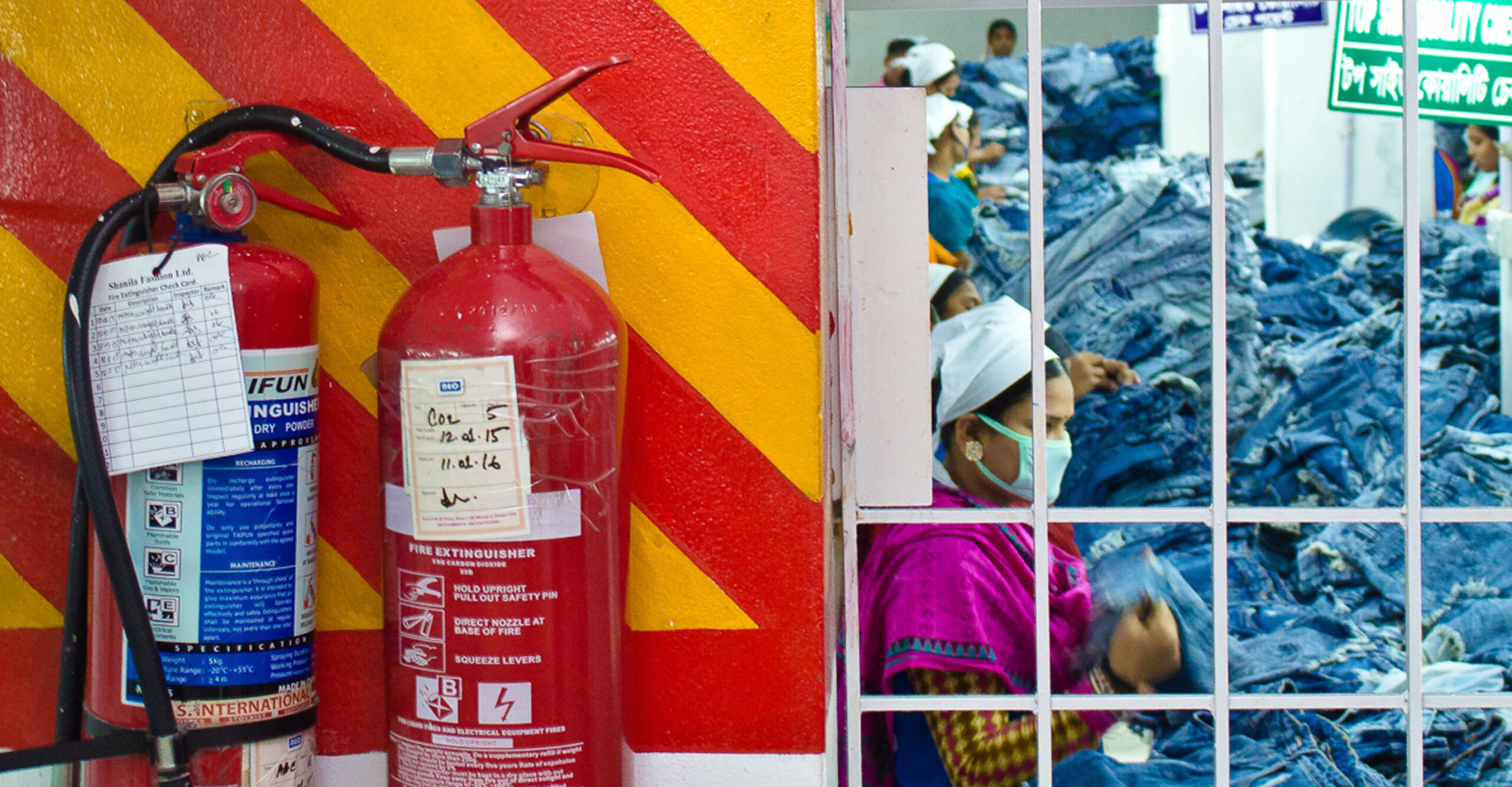
The Accord and RMG Sustainability Council (RSC), which carried forward Accord operations in Bangladesh since June 2020, have conducted nearly 56,000 fire, electrical, and building safety inspections at over 2,400 garment factories. Over 140,000 safety issues at these factories have been resolved, contributing to safer working conditions for workers.
While these efforts have borne tangible results in Bangladesh, the International Accord signatories have decided to extend these measures and learnings to Pakistan to ensure Pakistani textile and garment workers also have access to minimal health and safety measures including safe exits, fire alarm systems and workplaces with structural integrity.
“Together with our signatories and stakeholders, the Accord approaches the next decade with immense dedication and perseverance. We are determined to continue the health and safety work at factories in Bangladesh and contribute to a safer Pakistani textile and garment industry under the recently signed Pakistan Accord,” said Joris Oldenziel, Executive Director, International Accord.
On behalf of the Accord signatories,
International Accord Secretariat
END
For more information, contact:
- media@internationalaccord.org
- Mini Dixit, Communications Officer: mini.dixit@internationalaccord.org
Related updates
May 1, 2024
Day 2 of the International Accord’s All Signatory Meeting was dedicated to fostering meaningful engagement between the Pakistani industry and signatories to the Pakistan Accord.
April 24, 2024
The Accord commemorates 11 years since the Rana Plaza collapse by remembering those who perished, those who were injured, and those who continue living with the impacts of one of the worst workplace disasters in modern history.
March 28, 2024
The capacity-building program for recently hired engineers under the Pakistan Accord has officially commenced.
March 28, 2024
A series of recent brand-supplier meetings in Lahore and Karachi brought together Pakistan Accord signatory brands and their suppliers for discussions on enhancing occupational health and safety in the textile and garment industry.
January 25, 2024
Original Marines, Turner Bianca, S.O.K/ Group, Sun Garden,Tex Idea, and MPL Home are among the latest brands to sign the Pakistan Accord.
January 24, 2024
A total of 102 global brands and retailers have so far signed the Bangladesh Safety Agreement with Fast Retailing Co. Ltd, River Island and Triumph & Sloggi, among the latest signatories.
International Accord at the 4th UN South Asia Forum on Business and Human Rights
Accord
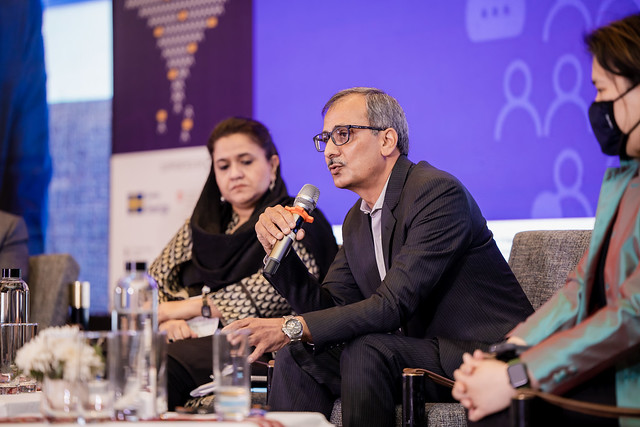
The International Accord participated in the 4th UN South Asia Forum on Business and Human Rights organised by UNDP Business and Human Rights Asia from 20-22 March 2023 in Kathmandu, Nepal.
The International Accord participated in the 4th UN South Asia Forum on Business and Human Rights organised by UNDP Business and Human Rights Asia from 20-22 March 2023 in Kathmandu, Nepal.
The forum brought together key stakeholders including governments, trade unions, civil society, businesses, UN agencies, and development partners that discussed over a dozen topics relevant to the United Nations Guiding Principles on Business and Human Rights (UNGPs) during the three-day deliberations.
International Accord participated in the plenary From Tragedy to Progress: Lessons from the Rana Plaza Building Collapse that analyzed the progress and highlighted the continued need to prioritize worker safety in the textile and garment industry. The session was moderated by Prof Pichamon Yeophantong, Chair of the UN Working Group on Business and Human Rights, and included insights from Shamim Ehsan (BKMEA), Mahruna Islam (UNDP) Kalpona Akter, Bangladesh Center for Workers’ Solidarity, and Zulfiqar Shah, Pakistan Consultant, International Accord.
- The contributions of the Accord in building a safer Bangladeshi garment industry.
- The importance of awareness, trust, and collaboration in ensuring human rights in business.
- The crucial role of stakeholder engagement, particularly the participation of local industry and government, in any new Accord country programs.
- The opportunities in replicating the Accord model in other major garment-producing countries.
- The benefits of legally binding agreements in ensuring transparency and accountability in garment supply chains.
Resources
Related updates
May 1, 2024
Day 2 of the International Accord’s All Signatory Meeting was dedicated to fostering meaningful engagement between the Pakistani industry and signatories to the Pakistan Accord.
April 24, 2024
The Accord commemorates 11 years since the Rana Plaza collapse by remembering those who perished, those who were injured, and those who continue living with the impacts of one of the worst workplace disasters in modern history.
March 28, 2024
The capacity-building program for recently hired engineers under the Pakistan Accord has officially commenced.
March 28, 2024
A series of recent brand-supplier meetings in Lahore and Karachi brought together Pakistan Accord signatory brands and their suppliers for discussions on enhancing occupational health and safety in the textile and garment industry.
January 25, 2024
Original Marines, Turner Bianca, S.O.K/ Group, Sun Garden,Tex Idea, and MPL Home are among the latest brands to sign the Pakistan Accord.
January 24, 2024
A total of 102 global brands and retailers have so far signed the Bangladesh Safety Agreement with Fast Retailing Co. Ltd, River Island and Triumph & Sloggi, among the latest signatories.
International Accord - Annual Signatory Fee Structure
International Accord - Annual Signatory Fee Structure
35 global brands and retailers have now signed the Pakistan Accord
Accord
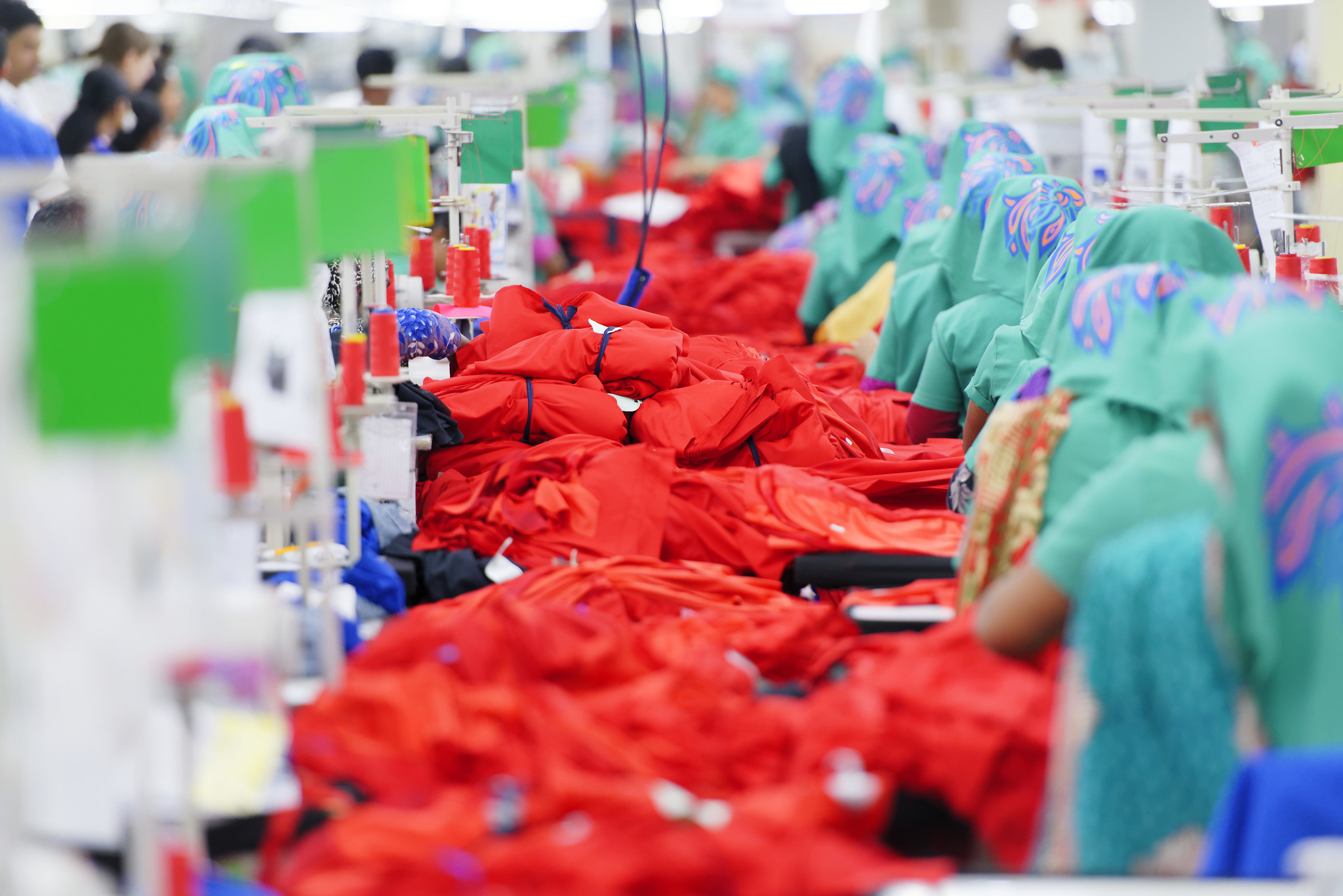
35 signatories to the International Accord have signed the Pakistan Accord to ensure worker safety in the country’s textile and garment industry.
35 signatories to the International Accord have signed the Pakistan Accord to ensure worker safety in the country’s textile and garment industry.
A total of 35 signatories to the International Accord for Health and Safety in the Textile and Garment Industry have signed the recently announced Pakistan Accord to date, with multiple brands finalising internal details and expected to sign in the coming weeks. The Pakistan Accord is a legally binding agreement between global unions, IndustriALL and UNI Global Union, and garment brands and retailers for an initial term of three years starting in 2023.
The factory listing of these brands would cover approximately 300-400 facilities in Pakistan. The program in Pakistan will retain key features from the 2021 International Accord: independent safety inspections to address identified fire, electrical, structural and boiler hazards, monitor and support remediation, Safety Committee training and worker safety awareness program, an independent complaints mechanism, a commitment to transparency, and local capacity-building to enhance a culture of health and safety in the industry.
“We are excited that many major brands and retailers have already confirmed their commitment to working together with their suppliers in a collective effort to further enhance workplace safety in Pakistan. We are convinced the Pakistan Accord can benefit the industry and its workers and promote sustainable and long-term business relationships between brands and their Pakistani suppliers. We look forward to seeing more brands join in the coming days and weeks,” said Joris Oldenziel, Executive Director, International Accord Secretariat.
On January 23, 2023, Accord Steering Committee members brands BESTSELLER, C&A, H&M, Inditex, Otto Group, and PVH Corp. released a statement reaffirming their commitment to the Pakistan Accord and encouraging more brands to sign the agreement.
“We encourage all brands around the world to sign the Pakistan Accord agreement and join us in our collective commitment to raise the safety standards at supplier factories in Pakistan,” the statement reads.
Resources
Related updates
May 1, 2024
Day 2 of the International Accord’s All Signatory Meeting was dedicated to fostering meaningful engagement between the Pakistani industry and signatories to the Pakistan Accord.
April 24, 2024
The Accord commemorates 11 years since the Rana Plaza collapse by remembering those who perished, those who were injured, and those who continue living with the impacts of one of the worst workplace disasters in modern history.
March 28, 2024
The capacity-building program for recently hired engineers under the Pakistan Accord has officially commenced.
March 28, 2024
A series of recent brand-supplier meetings in Lahore and Karachi brought together Pakistan Accord signatory brands and their suppliers for discussions on enhancing occupational health and safety in the textile and garment industry.
January 25, 2024
Original Marines, Turner Bianca, S.O.K/ Group, Sun Garden,Tex Idea, and MPL Home are among the latest brands to sign the Pakistan Accord.
January 24, 2024
A total of 102 global brands and retailers have so far signed the Bangladesh Safety Agreement with Fast Retailing Co. Ltd, River Island and Triumph & Sloggi, among the latest signatories.
International Accord at the OECD Forum on Due Diligence in the Garment and Footwear Sector
Accord
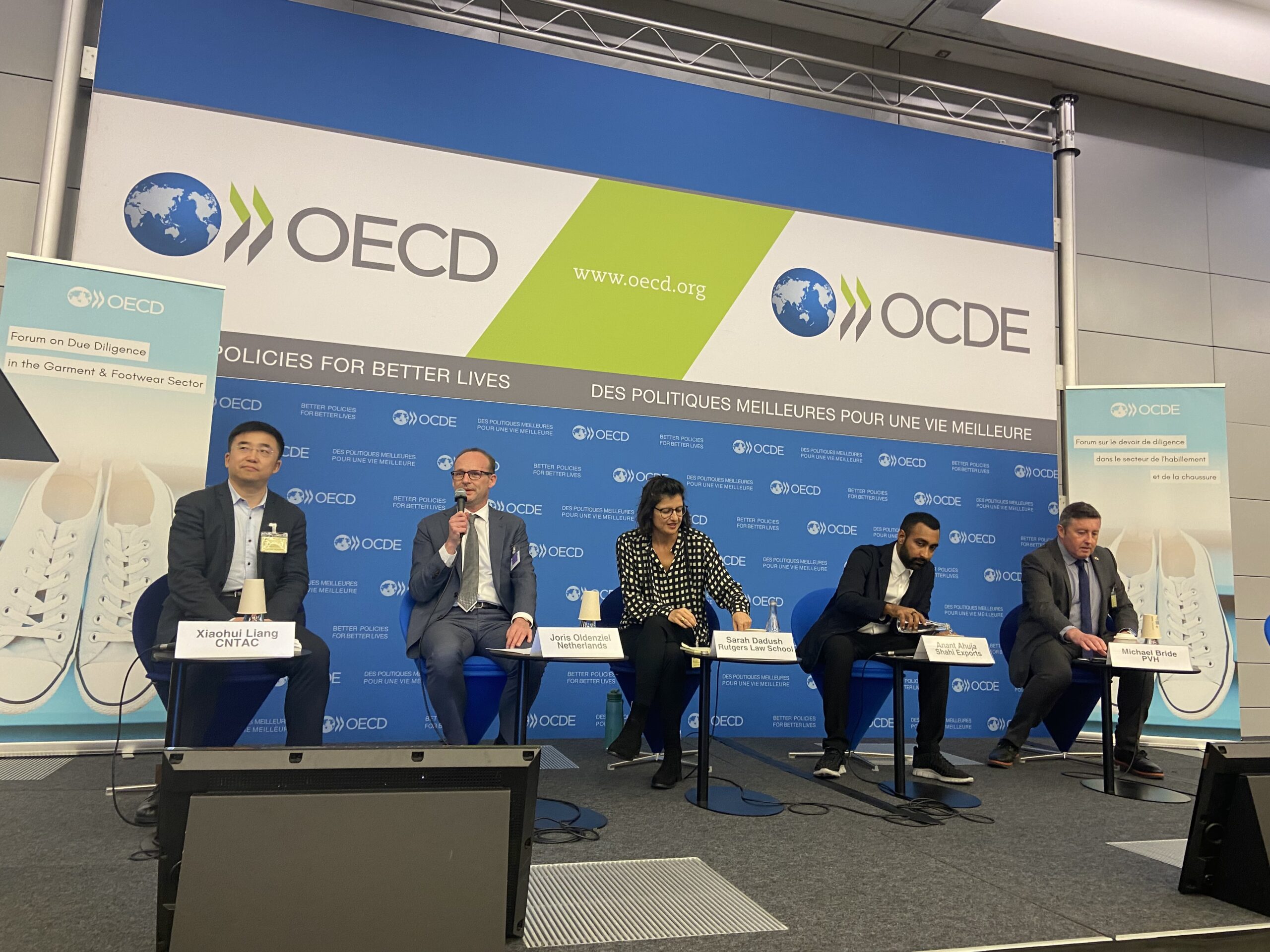
Event
Event
The OECD Forum on Due Diligence in the Garment and Footwear Sector was held online and offline (Paris, France) from 13-17 February 2023. The forum brought together representatives from government, business, trade unions, and civil society to promote transparency and due diligence in global garment supply chains.
In his capacity as the Dutch OECD National Contact Point, our Executive Director Joris Oldenziel moderated the session Due diligence costs and responsibilities: Collaborative approaches to buyer supplier relationships.
Speakers Sarah Dadush, Rutgers Law School, Xiaohui Liang from China National Textile and Apparel Council (CNTAC), Michael Bride from PVH and Anant Ahuja from Shahi Exports shared current examples, challenges and benefits of buyer-supplier collaboration models on shared due diligence implementation.
The session underscored that human rights due diligence is a shared responsibility for all actors in the garment supply chain. Michael Bride from PVH Corp emphasised upon the central role played by brands and the need for responsible business conduct. Sharing his thoughts as an exporter, Anant Ahuja highlighted the need to focus on innovative ways to carry out due diligence by focusing on training, retaining and investing in the well-being of workers.
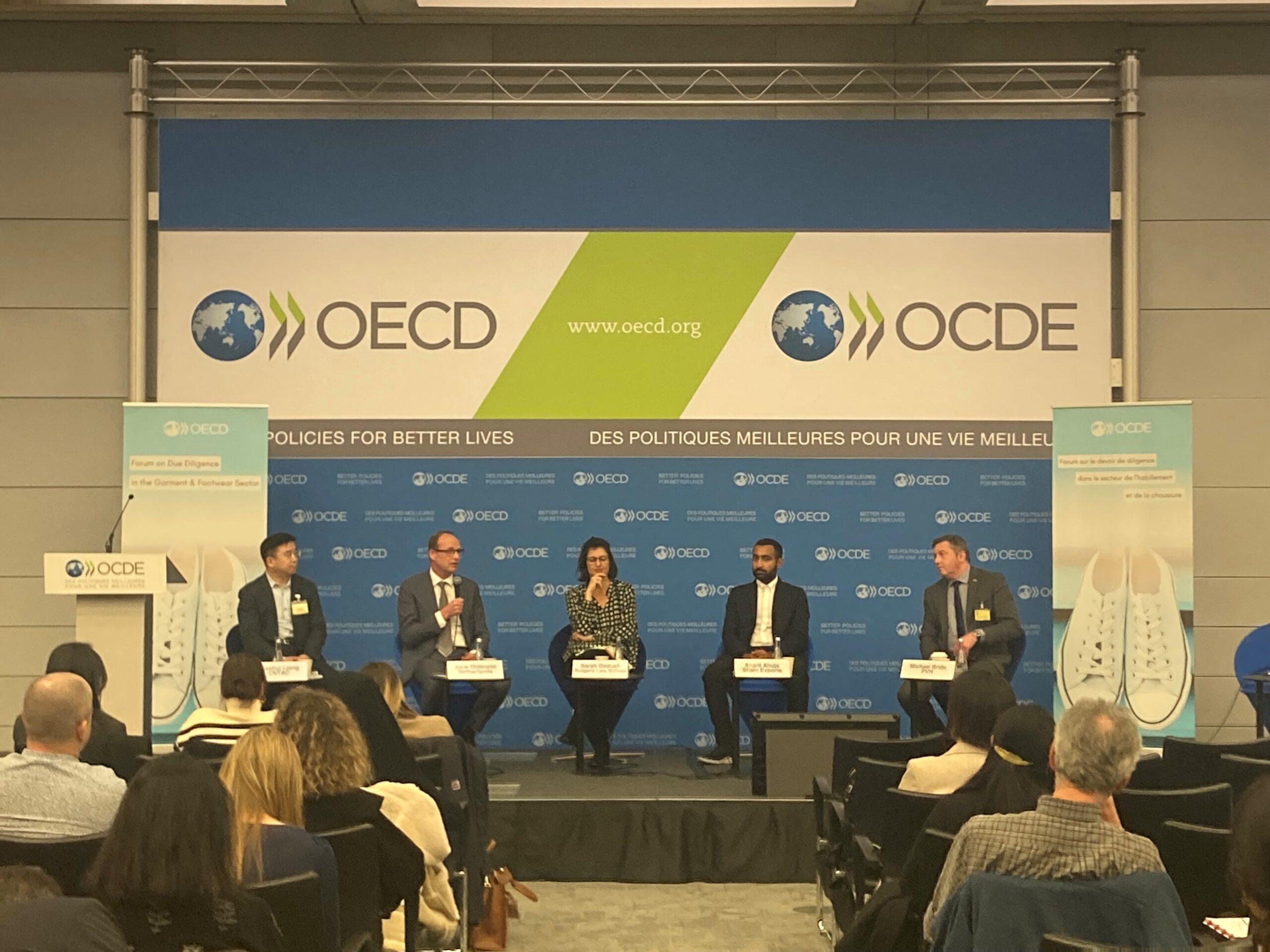
Citing the Accord as an example of collaborative approaches between buyers and suppliers, Shawn Islam, CEO, Sparrow Group of Industries and member of the Bangladesh Garment Manufacturers and Exporters Association (BGMEA) said:
“The Accord worked out wonderfully; it is a good example of how a collaborative approach between suppliers and buyers with the government’s support can really make a tremendous difference. We have made a lot of progress since 2013 and have become one of the safest places to produce garments in terms of electrical safety, structural safety, and fire safety.”
View the recorded session here.
In addition, the International Accord participated in the side session Ensuring local stakeholder- and worker-inclusive supply chain grievance mechanisms organised by Fairwear Foundation, CNV Internationaal and Bündnis für nachhaltige Textilien (Partnership for Sustainable Textiles) on 13 February 2023.
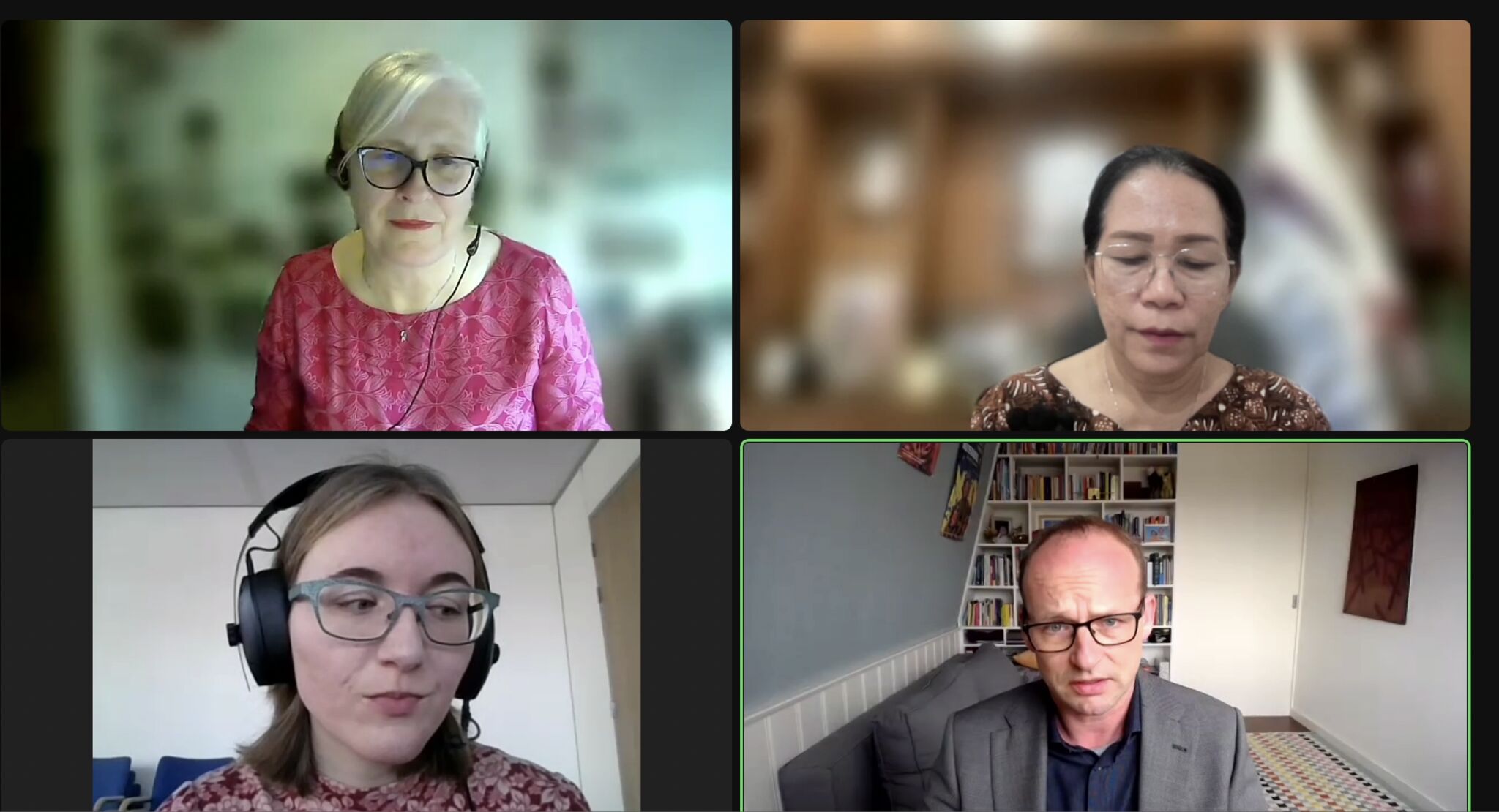
The session was attended by over 200 participants and discussed the approaches to improve the effectiveness and accessibility of grievance mechanisms for workers. Moderated by Dr. Jennifer Zerk, the session included insights from Fair Wear’s Valentine Wolfram, Suzan Cornelissen of CNV Internationaal, Elly Rosita from KSBSI, Emma Vogt from Clean Clothes Campaign, and Joris Oldenziel, Executive Director from International Accord.
View the recorded session here.
Resources
Related updates
May 1, 2024
Day 2 of the International Accord’s All Signatory Meeting was dedicated to fostering meaningful engagement between the Pakistani industry and signatories to the Pakistan Accord.
April 24, 2024
The Accord commemorates 11 years since the Rana Plaza collapse by remembering those who perished, those who were injured, and those who continue living with the impacts of one of the worst workplace disasters in modern history.
March 28, 2024
The capacity-building program for recently hired engineers under the Pakistan Accord has officially commenced.
March 28, 2024
A series of recent brand-supplier meetings in Lahore and Karachi brought together Pakistan Accord signatory brands and their suppliers for discussions on enhancing occupational health and safety in the textile and garment industry.
January 25, 2024
Original Marines, Turner Bianca, S.O.K/ Group, Sun Garden,Tex Idea, and MPL Home are among the latest brands to sign the Pakistan Accord.
January 24, 2024
A total of 102 global brands and retailers have so far signed the Bangladesh Safety Agreement with Fast Retailing Co. Ltd, River Island and Triumph & Sloggi, among the latest signatories.

